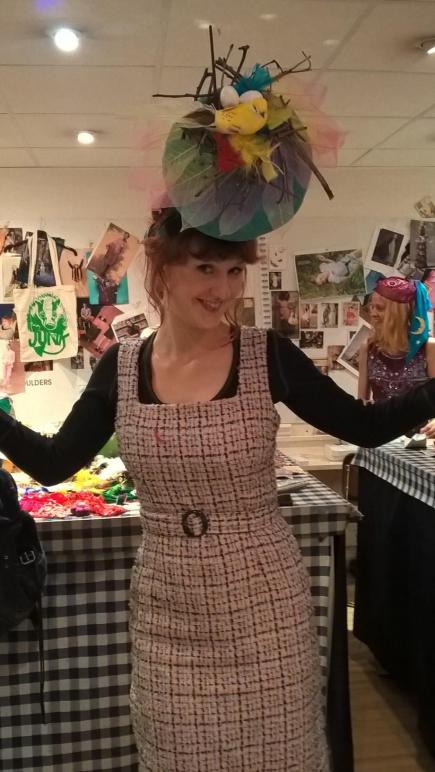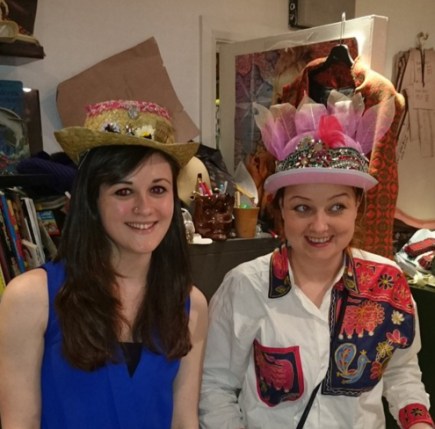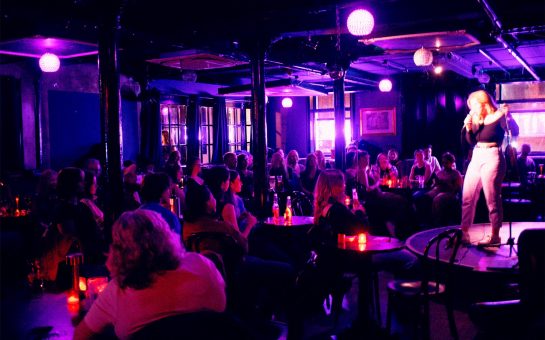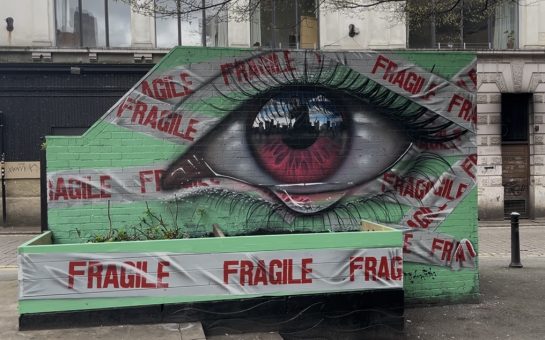A seamstress, designer and shop owner is giving a ‘feeling of empowerment’ back to Mancunians by working with charities and taking her trade to various festivals this summer.
Charlotte Keyworth, 37, who owns the Junk Shop in Manchester’s Northern Quarter, runs sewing workshops to put people back in touch with recycling their old clothes.
Junk Shop ran an Easter Bonnet workshop on Good Friday in preparation for activities with learning disabilities and mental health charity Creative Support within the next few weeks.

EASTER BONNET: Junk Shop held a workshop on Good Friday
Charlotte explained that the sewing workshops ‘lift people’s spirits’ so making hats, flowers and shopping bags with Creative Support will give them a huge ‘feeling of achievement’.
“It builds confidence and self-esteem,” she told MM.
“By creating something from scratch you get such a feeling of achievement, it’s something that money can’t buy.
“That’s why the sewing lessons at the shop are doing so well.
“It gives such a feeling of empowerment by creating something for yourself.”
Charlotte and other staff members at the shop, primarily 23-year-old Jessie Stringer, lead the frequent workshops in Junk Shop for those at different ability levels, ranging from beginner sewing classes to dress-making days.
All of the clothes that are sold in the shop are designed and hand-made by Charlotte who uses fabrics found from charity shops and overspill warehouses and all the items sold are fair trade.
“What we teach is how to make things that are simple, easy and enjoyable,” she said.
“It’s not a test of how perfect things are.
“It doesn’t matter if what you make isn’t perfect – it’s giving people the power back.”
Charlotte has done work with Creative Support before, their last collaboration taking place just before Christmas, and she describes their work as ‘fantastic’.
The charity provides ‘high quality care and support services for people with learning disabilities, mental health needs and complex needs’ including community and outreach support services, home care services and supported living services.
“Manchester’s been very good to us so we just wanted to give something back,” she said.
“A couple of years ago we did something for young women in shelters.
“We helped them to recycle their clothes and we put on a fashion show with them at the end.”

GETTING INVOLVED: Our reporter Ciara (left) made her own Easter bonnet
But she does admit they haven’t been as active this year as they have been in the past – something she is hoping to rectify this year.
Her plans to take Junk Shop’s work to festivals are not slowing though, and she already has a full summer calendar with Shambala, Glastonbury, Secret Garden and Boomtown on the cards.
Charlotte doesn’t just sell clothes there, but helps festival-goers to modify their own clothes and to ‘put sparkly things on’.
And Junk Shop has already made an impact at Glastonbury after Jay McAllister, also known as folk singer Beans on Toast, bought clothes for his entire crew at Charlotte’s stall.
“We’ve been trying to get into Shambala for four years and we’ve finally made it,” she said
“I’ve been going to Glastonbury for eight years.
“These festivals are the best thing for us.
“Most of the people there care about the environment and what we do – we’re appreciated there.
“Often, a lot of people don’t take the time to understand what we do.
“I really enjoy them – the people there are so lovely.”
Charlotte has been sewing since she was 14-years-old and has been designing her own clothes since graduating from the University of Salford in 2002.
The Junk Shop runs on the mentality that clothes are better hand-made, not only so people can gain this feeling of achievement and so they can wear something unique, but also for the environmental benefits that recycling has.
Charlotte said: “To me, fashion has lost its way. It’s destroying the planet.
“It’s the third most polluting industry after the oil industry.”
She explained that many high street shops which make their clothes overseas use certain chemicals and pesticides in the process that are banned in the UK.
We then wear the clothes and have these pesticides constantly on our skin while we gradually pollute our water when we wash them.
Charlotte claimed that ‘we’re slowly poisoning ourselves’ and points to The Cost of Clothing documentary, which demonstrates how damaging the industry really is.
She hopes that, by offering these classes and by selling her home-made clothes at reasonable prices, people will begin to move away from buying clothes at high street shops.
On Good Friday the Junk Shop ran an Easter bonnet workshop to get people feeling festive and positive.
Charlotte has been running this workshop for a couple of years and has, in the past, organised a parade for everyone to display their creations on Easter Sunday.
The Easter bonnet was initially made popular in New York after the Depression in the 1920s and Charlotte explained that, because people could not afford to buy clothes, they put flowers onto old hats to lift people’s spirits, knowing that spring was on the way.
Image courtesy of The Local Data Company, via Google Maps, with thanks



